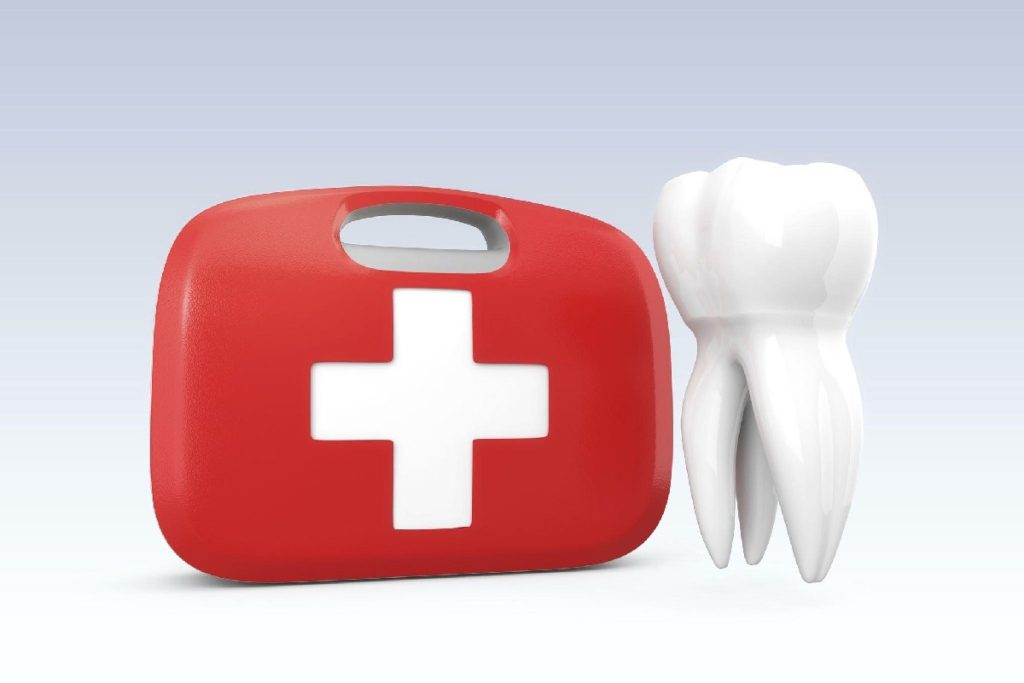“It only hurts a little.” “This lump feels warm, but I’ve been in the sun all day.” “I think this bump on my gums is just a pimple. It can wait.”
Sometimes a bothersome tooth is just that — minor discomfort that goes away on its own. But other times, you need dental care — and you need it right now!
So, when is the best time for emergency dental care?
Below we discuss what issues should be seen sooner rather than later, plus the benefits of emergency dental care in each situation.
Table of Contents
Severe Pain
Severe pain, especially a sharp or “shooting” pain that doesn’t have an identifiable reason, means you should see a doctor.
If the pain is in one or more teeth or inside the gum, you should see a dentist who specializes in emergency care.
What Could It Be?
Pain in the teeth or gums can mean any one of a number of issues happening. If you have recently knocked the area, or if you’ve eaten something hard and felt a pain when chewing, either of these may cause severe dental pain.
However, internal issues can also cause severe pain, such as a damaged root or an infection in the pulp of the tooth.
What the Dentist Will Do
Whether or not your dentist can immediately see a problem, they will likely take X-rays of the area. They may also do certain tests to support their conclusions, such as the “cold test” to assess the health of the nerve/root.
Your solution will depend upon exactly what the problem is. A cracked tooth may or may not be repaired. If it is too close to the root, the tooth may be pulled, although this is usually a last-case scenario. (Most dentists try all measures to preserve the tooth first.)
You may need a root canal, a deep cleaning if tartar buildup is causing your gums to recede, or tooth bonding.
A Painful, Warm Bump on the Gums
The mouth is a bumpy place, and there are areas, especially sublingually (under the tongue), that may have tiny lumps. These are natural and not a concern.
On the other hand, if you have a painful lump, especially if it’s on the gums, you may need emergency dental care.
What Could It Be?
A painful bump inside the mouth can be a simple blood blister, but it is best to get these checked out and not attempt to address them yourself.
Warmth (beyond the normal temperature of the inside of the mouth) may point to infection, such as a gum abscess. It is usually caused by an infection with bacteria clustered in the area.
What the Dentist Will Do
If the lump is an abscess, your dentist may drain it. You will then be given an oral antibiotic to be taken for a specified number of days.
If the lump is not an emergency situation (for instance, it may be fibrous tissue), the dentist may consider surgical removal at some point in the future.
A Knocked-Out Tooth
If you have knocked a tooth out, you should seek emergency dental care. However, if you have had a hard knock to the tooth and it’s “wiggly,” it may not be an emergency.
Either way, see your dentist right away.
What Could It Be?
If your tooth is loose, you can probably connect the issue to something that has happened very recently. This could be a knock to the mouth, biting on something very hard, or other trauma.
What the Dentist Will Do
There are several options when a tooth has been loosened or completely knocked out of the mouth.
In some cases, the tooth might be able to be placed back in its socket (if the root is preserved and you have gotten to your dentist quickly enough).
If your tooth has fallen out due to injury, rinse it immediately with water or salt water (saline), then if possible, keep it in the socket until you get to the dentist. You can also store it in milk. Your dentist will then assess what can be done to save the tooth.
In some cases, the tooth simply can not be saved. If this happens, your dentist will talk to you about a dental implant to replace the gap where the tooth used to be.
The Sooner You See a Dentist, the Better
If you’re unsure whether your tooth issue constitutes a medical emergency, call your emergency dentist immediately. They can tell you whether you should come in immediately, or whether the situation can wait until they have a regular opening in the near future to see you.
In either case, contacting your dentist right away could mean saving a tooth or resolving an infection. So be sure to call and ask. This way, you know you’re doing the right thing for your dental health.
